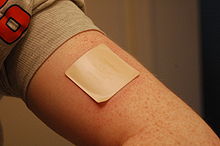- Nicotine replacement therapy
-
A nicotine patch is applied to the left arm

Nicotine replacement therapy (commonly abbreviated to NRT) is the remedial administration of nicotine to the body by means other than tobacco, usually as part of smoking cessation. Common forms of nicotine replacement therapy are nicotine patches (which transdermally administers nicotine) and nicotine gum (which orally administers nicotine). The primary benefit of nicotine replacement therapy is that it prevents cravings in a smoker whilst allowing them to abstain from tobacco—and thus avoid the harmful effects of smoking. NRT enables the easier overcoming of nicotine addiction because it reduces the craving to smoke. The incidence of smoking after the use of nicotine replacement therapy is 1.5–2 times less than when therapy is not used.[1]
Contents
Forms
 A man about to use a piece of nicotine gum.
A man about to use a piece of nicotine gum.Nicotine patches are a transdermal patch for the administration of nicotine. Nicotine gum, nicotine sprays, nicotine sublingual tablets, and nicotine lozenges administer nicotine orally. Nicotine inhalers are metered-dose inhaler that administer nicotine through the lungs;
Snus and nasal snuff also allow for nicotine administration outside of tobacco smoking, but do cause negative health effects.
Criticism
Cost
Another concern relates to the fact that people may become addicted to the NRT product and turn back to tobacco products to save money. Typically, the cost of NRT lasting seven days is up to £20 over the counter, whether spray, gum or inhaler, as against £4 to £6 for twenty tax paid cigarettes, or £3 for tax paid rolling tobacco. The cost of cigarettes or tobacco over the same period varies depending on the smoker, while the cost of NRT remains static regardless of the level of nicotine it contains. This leads to the relative cost of NRT versus cigarettes or tobacco being dependant on how much the individual smokes. The British NHS provides help in the form of prescriptions, reducing the cost to £7.40 per script, and if several products are included on one script then the price will drop well below that of actual cigarettes.
Exempted populations
Evaluation of NRT in real-world studies produces much more modest outcomes than efficacy studies conducted by the industry-funded trials. The National Health Service (NHS) in England has a smoking cessation service based on pharmacotherapy in combination with counseling support. An ASH report claims that the average cost per life year gained for every smoker successfully treated by these services is less than £1,000, below the NICE guidelines of £20,000 per QALY (quality-adjusted life year). However, the investment in NHS stop smoking services is relatively low. A comparison with treatment costs for illicit drug users shows that £585 million is committed for 350,000 problem drug users compared to £56 million for 9 million users of tobacco. This is £6.20 for each smoker, compared to £1,670 per illegal drug user (Action on Smoking & Health, 2008).
Disappointingly, the claims for high efficacy and cost-effectiveness of NRT have not been substantiated in real-world effectiveness studies.[2][3][4] Pierce and Gilpin (2002) stated their conclusion as follows: “Since becoming available over the counter, NRT appears no longer effective in increasing long-term successful cessation” (p. 1260).[4] Efficacy studies, which are conducted using randomized controlled trials, do not transfer very well to real-world effectiveness. Bauld, Bell, McCullough, Richardson and Greaves (2009) reviewed 20 studies the effectiveness of intensive NHS treatments for smoking cessation published between 1990 and 2007.[5] Quit rates showed a dramatic decrease between 4-weeks and one year. A quit rate of 53% at four weeks fell to only 15% at 1 year. Younger smokers, females, pregnant smokers and more deprived smokers had lower quit rates than other groups.
Trade names
Trade names include Nicorette, Nicoderm, Nicotinell and Commit Lozenge.
See also
- Nicotine addiction
- Tobacco smoking
- Smoking cessation
- Tobacco cessation clinic
- American Legacy Foundation
References
- ^ Stead et al. (2008), ch. 7
- ^ Doran et al. (2006), pp. 758–766
- ^ Ferguson et al. (2006) in Addiction, pp. 59–69
- ^ a b Pierce & Gilpin (2002) in JAMA v. 288 pp. 1260–1264
- ^ Bauld et al. (2010) in J Public Health (Oxf), v. 32, pp. 71–82
Bibliography
- Bauld L, Bell K, McCullough L, Richardson L, Greaves L (March 2010). "The effectiveness of NHS smoking cessation services: a systematic review". J Public Health (Oxf) 32 (1): 71–82. doi:10.1093/pubmed/fdp074. PMID 19638397. http://jpubhealth.oxfordjournals.org/cgi/pmidlookup?view=long&pmid=19638397.
- Doran CM, Valenti L, Robinson M, Britt H, Mattick RP (May 2006). "Smoking status of Australian general practice patients and their attempts to quit". Addict Behav 31 (5): 758–66. doi:10.1016/j.addbeh.2005.05.054. PMID 16137834. http://linkinghub.elsevier.com/retrieve/pii/S0306-4603(05)00159-0.
- Ferguson J, Bauld L, Chesterman J, Judge K (April 2005). "The English smoking treatment services: one-year outcomes". Addiction 100 (Suppl 2): 59–69. doi:10.1111/j.1360-0443.2005.01028.x. PMID 15755262. http://onlinelibrary.wiley.com/resolve/openurl?genre=article&sid=nlm:pubmed&issn=0965-2140&date=2005&volume=100&issue=&spage=59.
- Ginzel KH, Maritz GS, Marks DF, et al. (March 2007). "Critical review: nicotine for the fetus, the infant and the adolescent?". J Health Psychol 12 (2): 215–24. doi:10.1177/1359105307074240. PMID 17284486. http://hpq.sagepub.com/cgi/pmidlookup?view=long&pmid=17284486.
- Pierce JP, Gilpin EA (September 2002). "Impact of over-the-counter sales on effectiveness of pharmaceutical aids for smoking cessation". JAMA 288 (10): 1260–4. doi:10.1001/jama.288.10.1260. PMID 12215133. http://jama.ama-assn.org/cgi/pmidlookup?view=long&pmid=12215133.
- Shiffman S, Rolf CN, Hellebusch SJ, et al. (May 2002). "Real-world efficacy of prescription and over-the-counter nicotine replacement therapy". Addiction 97 (5): 505–16. doi:10.1046/j.1360-0443.2002.00141.x. PMID 12033652. http://onlinelibrary.wiley.com/resolve/openurl?genre=article&sid=nlm:pubmed&issn=0965-2140&date=2002&volume=97&issue=5&spage=505.
- Silagy C, Lancaster T, Stead L, Mant D, Fowler G (2004). "Nicotine replacement therapy for smoking cessation". Cochrane Database Syst Rev (3): CD000146. doi:10.1002/14651858.CD000146.pub2. PMID 15266423. http://www.mrw.interscience.wiley.com/cochrane/clsysrev/articles/CD000146/frame.html.
- Stead LF, Perera R, Bullen C, Mant D, Lancaster T (2008). "Nicotine replacement therapy for smoking cessation". Cochrane Database Syst Rev (1): CD000146. doi:10.1002/14651858.CD000146.pub3. PMID 18253970. http://mrw.interscience.wiley.com/cochrane/clsysrev/articles/CD000146/frame.html.
- http://www.mhra.gov.uk/index.htm
External links
Categories:
Wikimedia Foundation. 2010.

